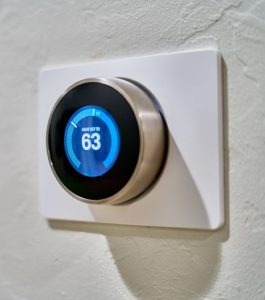 If you’ve seen advertising for smart thermostats, you may be wondering if investing in one is right for you. While you hope it can save you money and improve your home’s efficiency, on the other hand, you’re worried it’s an overpriced gadget you don’t need. To help you determine if a wi-fi connected thermostat is right for you, our Raleigh HVAC company breaks down what they do and their pros and cons.
If you’ve seen advertising for smart thermostats, you may be wondering if investing in one is right for you. While you hope it can save you money and improve your home’s efficiency, on the other hand, you’re worried it’s an overpriced gadget you don’t need. To help you determine if a wi-fi connected thermostat is right for you, our Raleigh HVAC company breaks down what they do and their pros and cons.
The Thermostats of the Past
Before we dive into smart thermostats, let’s look at your current one. Think of your thermostat as the comfort hub of your home. It allows you to set the temperature to your comfort preference, and using an internal thermometer and sensors, tells your heating or air conditioning unit when to kick on or off.
A manual or digital thermostat only allows you to change the setting immediately. For example, before you leave to go to work, you may turn up the air conditioner to 80 degrees to save on your energy bills, then turn it down to 72 when you come home. The downside to this is having to suffer while your home cools off.
A programmable thermostat may work well for people with a set schedule, often allowing you to set a five-day/two-day program, meaning a schedule for the work week and one for the weekend. You can program your home’s temperature to 80 degrees, then set it to lower to 72 an hour before you come home, so your home is pleasant when you walk in the door, while still saving you energy. However, programmable thermostats can be complicated to use, and most owners simply change them manually, bypassing the programming options.
What Is a Smart Thermostat?
A smart thermostat takes a programmable thermostat to the next level and offers you the most control and customization over your home’s comfort level. Equipped with wi-fi connectivity, advanced sensors, and even “smart learning” capability, a smart thermostat allows you to change your home’s thermostat from your laptop or smartphone. This means if you come home from work early, you can lower or raise your thermostat to your preferred temperature and you never have to worry about forgetting to set the thermostat when you’re gone on vacation!
What makes these connected thermostats truly “smart” is that many of them offer advanced learning, meaning they learn your behaviors and pick up ambient conditions like humidity, and auto adjust programming accordingly. Some models will give you a clear view of how efficient your heating and air conditioning system is by showing you how long it takes for your preferred temperature change to be achieved. You can even see the costs of your heating and cooling, so you can make immediate changes that will save you money on your energy bill.
Pros and Cons of a Smart Thermostat
Like any modern appliance or gadget, there are pros and cons that you’ll have to weigh to determine if one is right for your Raleigh home. The main benefits include:
- Convenience: You can update your temperature from anywhere and never have to worry about forgetting to adjust your temperature when you’re not home or making a mistake in your programming. Some may also be programmed to include reminders to change your air filters and perform other air conditioner maintenance tasks.
- Improved efficiency: The EPA’s Energy Star Program estimates that a smart thermostat can save several hundreds of dollars per year on your heating and air conditioning costs.
- Clear-cut data: A smart thermostat allows you to see in real time how much energy you’re using and what kind of changes you can make to reduce your energy usage and lower your bills.
- Easy installation: Most smart thermostats are designed to where even a beginner can install them with ease, and there are also plenty of YouTube tutorials to walk you through the process.
On the other hand, there is one major downside to a smart thermostat and that is cost. Most good quality smart thermostats begin at around $200, though sales on them are common.
So, is a smart thermostat right for you? Well, it depends. If you have a manual or digital thermostat and want to do more to regulate your home’s temperature when you’re not there, a smart thermostat is probably a smart investment. If you are really good at keeping up with your programmable thermostat and have a pretty set schedule as to when your home is occupied or not occupied, you may find that sticking with your existing thermostat is your best option!


